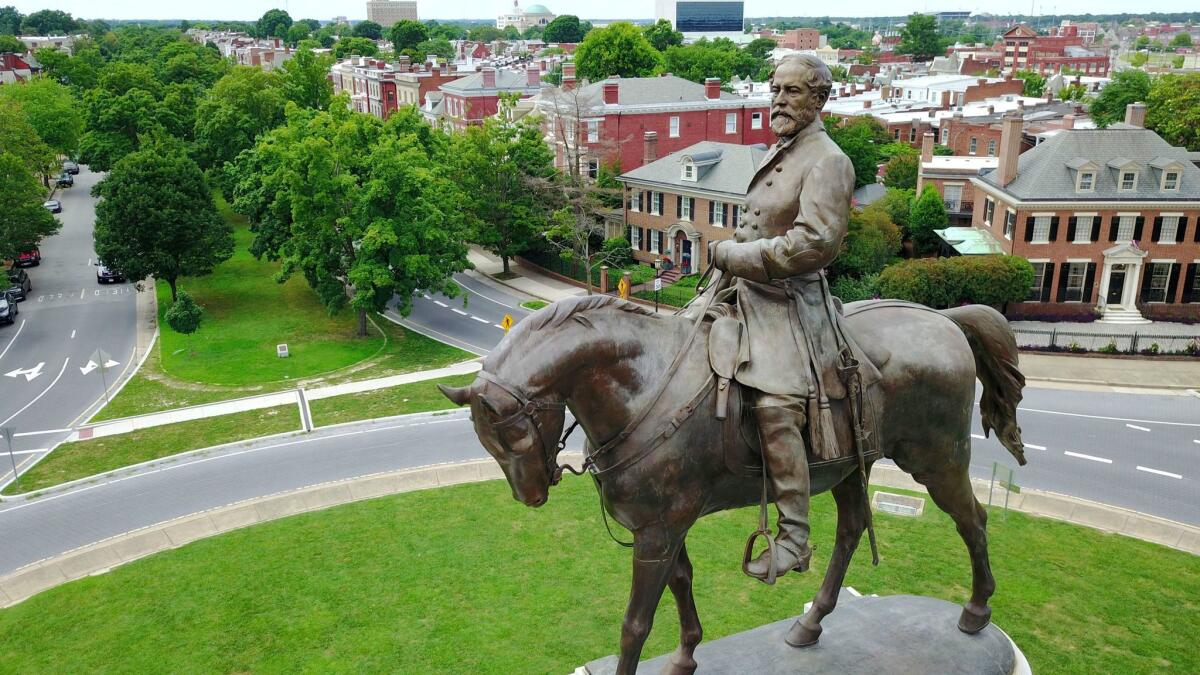Q&A: This Confederate history activist condemns white supremacists but says Trump was right

Thirteen years ago, Brag Bowling was worried about green paint balls that had been splattered on a statue of Stonewall Jackson and the words “Death to Nazis” spray-painted on one of Robert E. Lee. Both memorials stand in the middle of roundabouts on Monument Avenue in the Virginia city of Richmond, once the capital of the Confederacy.
In an interview at the time, Bowling, who was the leader of Virginia’s Sons of Confederate Veterans organization, said the vandalism should be classified as a hate crime. “These monuments are the city’s biggest tourist attraction,” he added.
From time to time Bowling spoke out on issues that concerned him, including a construction project that threatened to uproot the Museum of the Confederacy and efforts by heritage groups like his to preserve a holiday in Lee’s honor.
Bowling, who retired from the organization’s leadership, now describes himself as a concerned citizen of Richmond as leaders there consider whether to remove or modify Confederate monuments along the Richmond thoroughfare.
In a conversation with The Times this week, he said that white supremacists were among the “trash of the world” and that the violence in nearby Charlottesville prompted him to withdraw his request to hold a protest on Monument Avenue to preserve its memorials.
“It's too dangerous,” Bowling said. “I don't want anybody getting hurt.”
Here’s the interview, lightly edited for clarity:
What is the importance of Confederate imagery and monuments to you and to others who are concerned about this history?
Well, all of them are [important], but in particular the Robert E. Lee monument on Monument Avenue. I view him as a great man, as maybe the greatest general in American history. I also view him as the person after the war who did the most to bring the country together.
He became the president of Washington and Lee [University]. He preached reconciliation. He taught young Southern men to be good citizens. He was so revered in the South. In fact, even in Appomattox some of the generals said, “Let's go into the mountains and fight guerrilla-warfare style,” which would of course have really torn the country apart, and of course he refused to do it. He said, “We fought a good fight and it's now time to be good citizens.”
Sign up for the free Essential Politics newsletter »
With proposals to remove his statue in Richmond and in other places, what does that mean to you?
It reminds me of what is happening in the Middle East, and I don't think there is some grand chorus of people demanding the statue to be torn down. I watched [this week] in Durham where the police just stood by and watched them pull down a statue. [The] Lincoln Memorial was vandalized. I've seen people call for the tearing down of the Jefferson Memorial.
It bothers me that you'll see once the Confederate statues are gone, you'll see the Founding Fathers gone. This is a way of erasing history and taking over, making it like a whole new country. I'm watching these spontaneous demonstrations and I don't believe it. Somebody is paying for them.
There is a difference between what happened with the Civil War and the Founding Fathers owning slaves, which was an established norm in the United States at that time. There are a lot of people saying that it is not fair to equate those two things. And nobody is calling for removing Founding Fathers.
Oh, sure they are. You haven't been paying attention. It hasn’t been revved up like the Confederate statues but they are out there.
Let's talk about what happened last weekend in Charlottesville. Were you there?
No.
Was Sons of Confederate Veterans involved in the marching or any of the planned protests?
Not that I know of. The SCV has rules opposing people like that.
Opposing white supremacy, neo-Nazis and hate speech?
Yeah, things like that — you can get kicked out of the SCV.
It seems to me that a lot of people are pointing at one thing when really they mean another. Is this an argument about white supremacy and this term that has been coined — the “alt-right” — and isn't that different from groups like yours that would like to see these monuments preserved very publicly and not in a museum?
It is a huge difference. Liberal leaders in places like Charlottesville and Richmond are bringing this subject, monument removal, right to the forefront. They call this healing and talking to each other, but they are not really doing it. Levar Stoney, our mayor, founded a committee which he says is made up of civic leaders and Civil War scholars. His idea is, don't tear down these monuments, but they need to be reinterpreted — put a little plaque out in front of each one.
I'm a traditionalist that likes Monument Avenue to remain the way it is, the way it has been for 100 years. None of us were even asked to be on the committee. It is a stacked committee. He is going to have them torn down or more likely have signage put out in front of each one. His opinion of what each one of those monuments represents is probably 100 degrees different than the way I would look at it. It would be his opinion that is put on the sign, and I don't think that’s right either.
It's best not to kick a beehive. Because that’s what he is doing. There are literally millions of people that don't want Monument Avenue touched, and he is kicking a beehive because what he has done is very divisive.
President Trump ’s response on Saturday triggered a lot of outrage, and based on what you are saying, your organization would condemn participating in any sort of rally like this.
Oh yeah, those people are the trash of the world, on all sides.
What does that mean, “on all sides”? The counter-protesters that showed up?
The counter-protesters and the Klan people and the white supremacists, they are all — I look at them in the same way. These counter-protesters, a lot of them came with baseball bats and the media is trying to make them look like they were just innocent bystanders, and the white racists took them down. Trump said what it was — that none of them are good, and he is right. I agree with him 100%. His base has not been touched by his remarks. It might be strengthened.
So you feel like he said the right thing and that there are nice people that were participating?
The nice people were people like me that were there solely for protesting tearing down the monument — normal citizens. It wasn't just the racist whites or the racist blacks or the antifa or those guys; there were people also there that were protesting normally the way you’re supposed to. The other people didn't come to protest these monuments being torn down. They came to knock heads.
I thought you said you were not there. You were there?
I watch television. It's been 24-hour-a-day coverage of Charlottesville.
There are literally millions of people that don't want Monument Avenue touched, and [the mayor] is kicking a beehive because what he has done is very divisive.
— Brag Bowling, Confederate history activist
So what is next?
I had scheduled a rally at the Robert E. Lee monument to protest the tearing down of monuments close to a month ago. I applied for a permit, and last Saturday Charlottesville happened, and I had to withdraw the permit request. It's too dangerous. I don't want anybody getting hurt.
You withdrew it yourself?
Yeah. [On] Monday.
What would you propose? It seems like this is a moment where the country is very deeply divided. It sort of feels like a tinderbox, and a lot of other issues are getting conflated within this moment. How do you propose people can come together again and move past this?
That might be a bigger job than I can accomplish. I wish there was a way people would come together, but I have not seen a division like this — probably not since 1860. There is not much that I can do about that. But I do know what I believe in, and I do not want these monuments to be touched, and I believe they were great people, and I hate this. I saw that on TV in Charlottesville and I was going, “What in the heck is going on? Look at these nuts!”
I blame the mayors of Charlottesville and Richmond and [the state of] Virginia for a lot of this trouble. There is a monument protection law in Virginia, which should stop tearing-down of monuments. There is a court case in Charlottesville where an injunction was granted against the city for six months to prevent them from tearing down the monument, and this is coming to an end. It will be interesting to see how the court rules, but if you take a literal reading of the monument protection act, there shouldn't even be a question. They should not be allowed to do it.
Is there anything I'm not asking you that you think is important in this debate?
I think black residents of cities like Richmond and Charlottesville should be aghast at the use of scarce funds to tear down monuments when they have to send their kids to substandard schools. It's just misplaced priorities and I think that is going to come back and haunt [the] mayors. If they tear down this monument, there is going to be a fight like you wouldn't believe, I think. People don't want this monument down.
Special correspondent Vera Castaneda contributed to this report.
Twitter: @cbellantoni
ALSO:
Who was responsible for the violence in Charlottesville? Here's what witnesses say
A guide to some of the far-right symbols seen in Charlottesville
CEOs of Intel, Merck and Under Armour quit Trump advisory panel over Charlottesville controversy
Get the L.A. Times Politics newsletter
Deeply reported insights into legislation, politics and policy from Sacramento, Washington and beyond. In your inbox three times per week.
You may occasionally receive promotional content from the Los Angeles Times.








